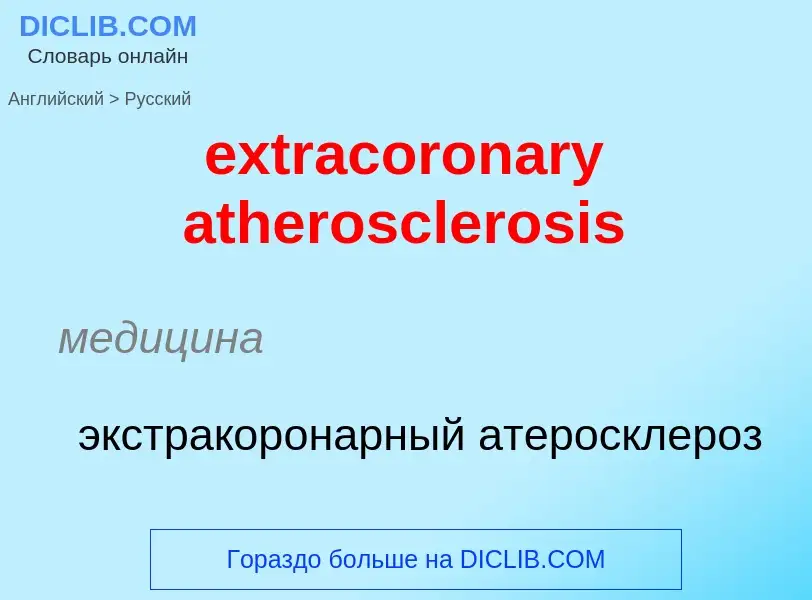Μετάφραση και ανάλυση λέξεων από την τεχνητή νοημοσύνη ChatGPT
Σε αυτήν τη σελίδα μπορείτε να λάβετε μια λεπτομερή ανάλυση μιας λέξης ή μιας φράσης, η οποία δημιουργήθηκε χρησιμοποιώντας το ChatGPT, την καλύτερη τεχνολογία τεχνητής νοημοσύνης μέχρι σήμερα:
- πώς χρησιμοποιείται η λέξη
- συχνότητα χρήσης
- χρησιμοποιείται πιο συχνά στον προφορικό ή γραπτό λόγο
- επιλογές μετάφρασης λέξεων
- παραδείγματα χρήσης (πολλές φράσεις με μετάφραση)
- ετυμολογία
extracoronary atherosclerosis - translation to ρωσικά
медицина
экстракоронарный атеросклероз
[æθərə(u)sklə'rəusis]
медицина
атеросклероз
существительное
медицина
атеросклероз
медицина
коронарный атеросклероз
Ορισμός
Βικιπαίδεια
Atherosclerosis is a pattern of the disease arteriosclerosis in which the wall of the artery develops abnormalities, called lesions. These lesions may lead to narrowing due to the buildup of atheromatous plaque. At onset there are usually no symptoms, but if they develop, symptoms generally begin around middle age. When severe, it can result in coronary artery disease, stroke, peripheral artery disease, or kidney problems, depending on which arteries are affected.
The exact cause is not known and is proposed to be multifactorial. Risk factors include abnormal cholesterol levels, elevated levels of inflammatory markers, high blood pressure, diabetes, smoking, obesity, family history, genetic, and an unhealthy diet. Plaque is made up of fat, cholesterol, calcium, and other substances found in the blood. The narrowing of arteries limits the flow of oxygen-rich blood to parts of the body. Diagnosis is based upon a physical exam, electrocardiogram, and exercise stress test, among others.
Prevention is generally by eating a healthy diet, exercising, not smoking, and maintaining a normal weight. Treatment of established disease may include medications to lower cholesterol such as statins, blood pressure medication, or medications that decrease clotting, such as aspirin. A number of procedures may also be carried out such as percutaneous coronary intervention, coronary artery bypass graft, or carotid endarterectomy.
Atherosclerosis generally starts when a person is young and worsens with age. Almost all people are affected to some degree by the age of 65. It is the number one cause of death and disability in the developed world. Though it was first described in 1575, there is evidence that the condition occurred in people more than 5,000 years ago.

![Severe atherosclerosis of the [[aorta]]. [[Autopsy]] specimen. Severe atherosclerosis of the [[aorta]]. [[Autopsy]] specimen.](https://commons.wikimedia.org/wiki/Special:FilePath/Atherosclerosis, aorta, gross pathology PHIL 846 lores.jpg?width=200)

![Microphotography of arterial wall with calcified (violet color) atherosclerotic plaque ([[hematoxylin]] and [[eosin]] stain) Microphotography of arterial wall with calcified (violet color) atherosclerotic plaque ([[hematoxylin]] and [[eosin]] stain)](https://commons.wikimedia.org/wiki/Special:FilePath/Calcificatio atherosclerotica.jpg?width=200)
![luminal]] narrowing. Tissue has been stained using [[Masson's trichrome]]. luminal]] narrowing. Tissue has been stained using [[Masson's trichrome]].](https://commons.wikimedia.org/wiki/Special:FilePath/RCA atherosclerosis.jpg?width=200)

